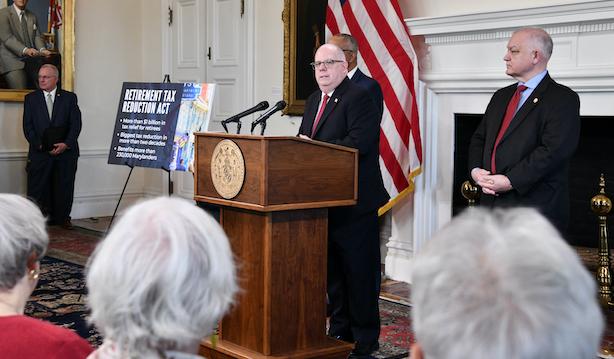Gov. Larry Hogan on Thursday proposed more than $1 billion in tax cuts for Maryland retirees.
“Today we’re taking a major step forward in those efforts by introducing the Retirement Tax Reduction Act of 2020, which will cut income taxes by more than $1 billion over the next five years,” he said at a news conference at the State House.
Hogan said that under the proposal, retirees who make $50,000 a year or less “will pay no state income tax whatsoever.” Retirees who make less than $100,000 a year “will see a tax reduction of no less than 50 percent — up to 100 percent,” he said.
The governor said the legislation would benefit more than 230,000 Marylanders. The proposal is “the largest tax reduction in Maryland in more than two decades,” he said.
Hogan said a major impetus for the proposal is having heard stories dating back to his first run for governor in 2014 from people who expressed affection for Maryland but said they could no longer afford to live in the state because of the tax burden.
“It will help keep tens of thousands of Maryland retirees from being forced to flee our state.”
Hogan was asked about the proposal’s chances of being passed by the General Assembly.
“If we’re having these discussions about how we have enough money to talk about fairly drastic increases in spending, I’d like at least part of the discussion to be about: ‘How do we let people keep some of their own money.’
“We actually have been successful on retirement taxes. We decided that we knew we couldn’t get the size of a bill that we’re announcing today through — but we did get targeted tax relief for retirees in several groups.”
Hogan pointed to the Hometown Heroes Act as an example. The 2017 legislation exempts law enforcement and first responders from paying state taxes on the first $15,000 of their retirement income. This year’s proposal would expand the law to eliminate state taxes on retirement income for law enforcement and first responders.
While Hogan is proposing tax relief, some Democrats have proposed modest tax increases on income that is not related to retirement or salary. On Wednesday a group of House Democrats unveiled 10 bills that would raise an estimated $2 billion for education improvements by 2030. The bills have not yet been filed.
Del. Julie Palakovich Carr, D-Montgomery, who sponsored one of the bills, spoke with MarylandReporter.com prior to Thursday’s news conference. She said her proposal would impose an additional 1 percent tax on capital gains and real estate properties. Carr said the proposal would not affect personal property taxes.
“If you look systematically at where our tax code is at a lot of Marylanders are actually paying more than their fair share at this point, for many working-class families and even upper-middle-class families. So we’re just making sure that our tax code is actually fair — that wealthy corporations and ultra-wealthy individuals are paying their fair share in terms their contributions to the state.”
MarylandReporter.com asked Hogan at the news conference how the proposal might affect the state’s economy.
“I haven’t seen the proposal and maybe I’ll let the budget secretary try to tackle that one. But I’m sure it would have some impact. But I haven’t seen any studies on that.”
Secretary of Budget and Management David Brinkley followed up on the question.
“It could be a hybridization of whatever they’ve done in the past. But we have to see how that affects corporate earnings and everything else here. We haven’t seen the details on that particular one so we can get back to you once we see all that. But it’s a repeat pattern of things that have come in the past and have been turned down by the legislature.”
By Bryan Renbaum
Don’t miss the latest! You can subscribe to The Talbot Spy‘s free Daily Intelligence Report here.



Write a Letter to the Editor on this Article
We encourage readers to offer their point of view on this article by submitting the following form. Editing is sometimes necessary and is done at the discretion of the editorial staff.